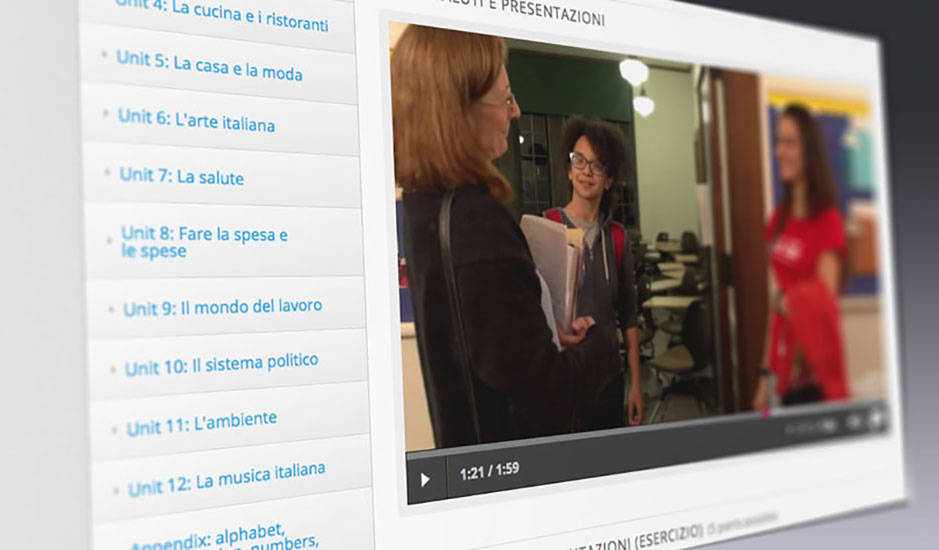Italian's Online Debut a Success

Wellesley’s first online language course wrapped up this week. The non-credit summer course Beginning Italian Language and Culture was offered to incoming first-year students, prospective students, and alumnae living distant from the College by invitation through edX Edge.
A brainchild of Daniela Bartalesi-Graf, lecturer in Italian Studies, the course offered a choice of a 12-unit intensive, or six-unit nonintensive, multimedia program. Finishing either program earned students a certificate confirming they’d completed the equivalent of one year or one semester of Italian, respectively.
Bartalesi-Graf started thinking about the possibilities of teaching a foreign language online when Wellesley joined edX in 2013 as the first liberal arts college to offer massive open online courses (MOOCs) through that platform. “I was already interested in online learning at that point,” she recalls, “and when the College put out a call for courses it really got my brain going, thinking about how this was going to work.”
The driving philosophy of the course is to use the technology to serve different learning styles, and to present the material from multiple angles. So for each unit there are video skits depicting everyday conversations, traditional grammar charts on printable PDFs, audio interviews with native speakers, slideshows with narration, interactive quizzes, and other mechanisms to meet the needs of different learners, including a new feature called "Voice Comparison," designed and implemented for the course by CIO and Associate Dean of WellesleyX Ravi Ravishanker, which let students record their voice and compare it to that of a native speaker using two wave forms placed one above the other.
In addition to the multi-modality, says Bartalesi-Graf, she really wanted to make it an academic course. Plenty of commercial language programs help tourists or businesspeople learn to speak, but Wellesley's Italian faculty made sure this course did that and teach the structure of the language and the culture behind it.
The course received support from the Deans’ Office, the Department of Italian Studies, the Italian Consulate in Boston, and the Italian Ministry of Foreign Affairs.
The video skits were made on campus starring Wellesley students who are native or "near-native" speakers, with scenes ranging from the academic quad and classrooms to res hall laundry rooms. Instructional Media Director Jarlath Waldron spent many hours with his group of student workers filming and editing the 41 Ciak! videos.
Senior Instructional Technologist David O’Steen and Research and Instruction Librarian Laura O’Brien have been collaborating with Bartalesi-Graf for over a year on various aspects of the course. They worked together to figure out how to best present the grammar, vocabulary, and cultural content on the edX Edge online platform, helped develop and then create question types for tests and exercises, determined the software and hardware needed to record slideshows, and discussed outreach to alumnae and incoming students. They also answered technical questions for students while the course was running.
Five hundred and sixty people registered on edX Edge to take this class; of these about 400 actively engaged with the material, and 168 were still active during the last week. “Considering that the usual drop out rate in MOOC courses is 90 percent, I think this is a good number,” says Bartalesi-Graf.
Students who sought the certificate had to complete tests for each subunit—41 tests in all for the 12-unit intensive course. The course is currently archived, but this fall Bartalesi-Graf will incorporate it in Wellesley’s first blended course, Intensive Beginning Italian, which will meet three days a week in class and two days a week online. As a long time member of the department, Professor of Italian David Ward was very proud that Italian Studies was involved in this groundbreaking initiative, a first for the College.
To date the team has received about 100 evaluations of the summer course, which they will soon comb through looking for ways to tweak and improve it for next time. And they have already received a great deal of positive feedback outside the evaluations. Among these, a member of the Class of 1967 writes, “Thank you so much for making it a truly Wellesley experience, with all the discipline, rigor, and clear instruction that I remember.”
